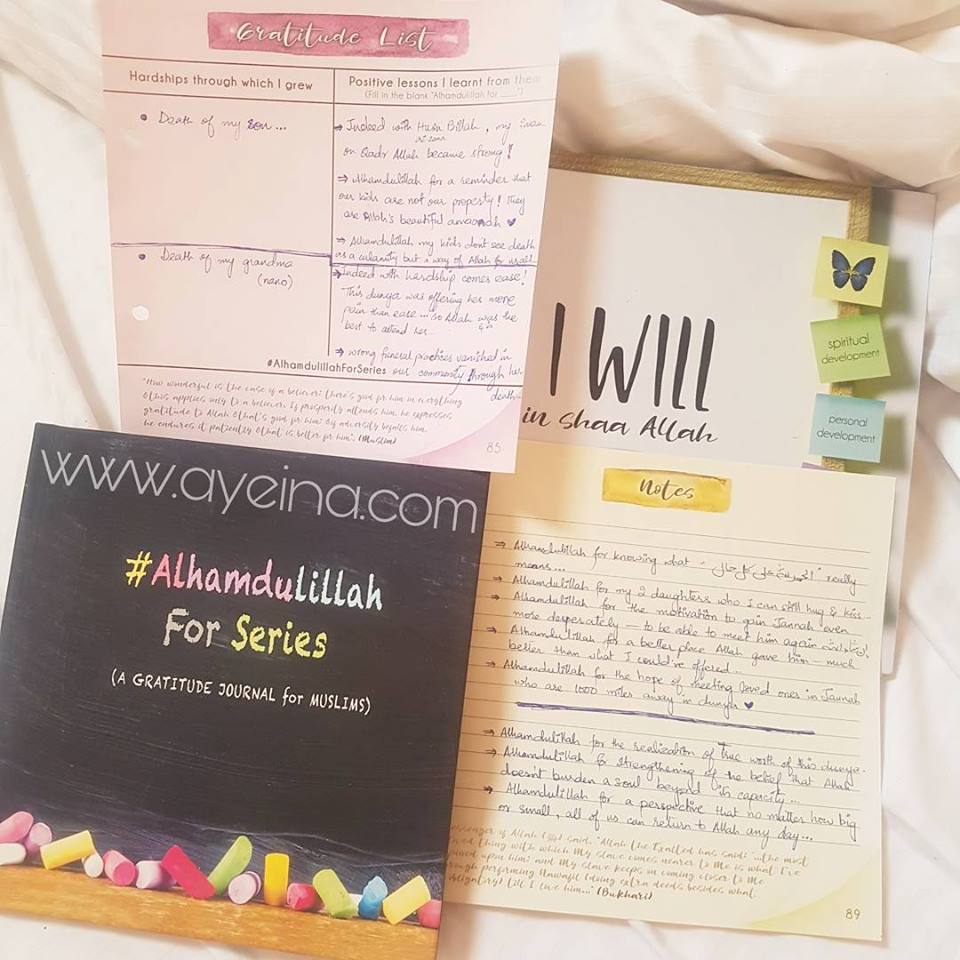Previous Part: Funeral of a Child in Islam
When I lost my youngest son, one of the hardest thing was to tell this to my daughters – who were anxiously waiting for their brother’s return from the hospital. They had named him themselves. They had practiced with pillows on how to hold him. They had probably envisioned him as well.
So turning all that down seemed a little harder than I expected but also went smoother than I expected alhamdulillah – as the eldest was introduced to the concept of death long ago. She’s 5 now but was introduced with this concept by the age of 3. She may not have realized the gravity of it though till she actually experienced it.
Some may think that a concept of death is too early to teach at such young age but death is an inevitable part of life and it is our responsibility to ensure our kids are aware of it. You may be surprised at how aware children already are about death. They see dead insects, dead birds and animals on the road. Children read about death in the stories, sometimes watch it in cartoons too or even role-play death in school plays. Without realizing it, they already have some exposure to the concept. It’s a law of nature. It means that there’s space in the world for everyone who’s born.
As stated by Sheryl on “how to build resilient kids even after a loss” – “As parents, teachers and caregivers, we all want to raise resilient kids — to develop their strength so they can overcome obstacles big and small. Resilience leads to better health, greater happiness and more success. The good news is that resilience isn’t a fixed personality trait; we’re not born with a set amount of it. Resilience is a muscle we can help kids build.”
Recently my grandmother passed away as well and the topic of death surfaced all over again – probably uncovering all the previous wounds that the news of death brings along with it. Which is why my 5 year old kept repeating how Allah took her super nano (great grandma) away just like He took away Muhammad (her brother) and that both of them are now in the graveyard…
Even if you have never experienced a death of a loved one (and may Allah keep you safe from such hurt as long as possible), It’s important to know how to introduce this concept to a child:
1) Have a heart-to-heart conversation
Get on your child’s eye level so he/she knows that you are interested and engaged in the conversation. That you care. That their feelings matter as much as yours.
My daughters kissed their brother and went off playing with other kids but they only got to actually realize it when they were laid down to sleep. The eldest cried and cried and cried…At that moment, we got time to have a heart to heart conversation.
2) It’s ok to cry in front of or with your child
Don’t hide your grief from your child. Children are sensitive barometers of emotion and are tremendous observers. You may think that watching you break down might frighten your kids, but to your surprise, the kids will end up comforting you and you will comfort them, which will help ease your sadness and even their own grief. Sometimes hugs do the job best!
…Allah does not punish for the shedding of tears or the grief of the heart, but punishes or bestows mercy for the utterances of this (and he (PBUH) pointed to his tongue). [Bukhari and Muslim]
Don’t be afraid to talk about or share memories of the loved one you lost…Even to this day, she usually talks about how cute her brother was. And asks everyone if they thought the same…So I let her know that yes we were blessed and still are – because one day we will meet him again in shaa Allah if we all strive for Jannah more and more everyday…
3) Tell them the truth
If they see you crying, the truth would give an explanation for your tears and pain. If you’re not crying, truth is still essential. Children are extremely curious beings and if you haven’t talked about death yet, you may find a window of opportunity when they discover a dead bird or insect etc. Try to reinforce the concept that all living things eventually die as we all belong to Allah and we all will one day return to Him. Whoever lives, will die and whoever dies will live again.
“And do not mix the truth with falsehood or conceal the truth while you know .” [Qur’an – 2:42]
4) Use simple and clear words
Using realistic words to describe death helps the grieving process. Although they may not need to know more than what they asked about. Give them simple answers. Treat their inquiries seriously. You surely want your child to come back to you with more questions in the future. Even if they are weird. They help them learn. And most of all, they help YOU learn!
Explaining the concept of “rooh/ruh” (spirit) really helps as well. I explained my 4 year old with the help of her doll. I told her that your doll has a body but no rooh so she can’t talk, move or listen. No matter how you’ll play with it, it won’t feel anything. It won’t get scared. It won’t get hurt. What makes us human beings different is that we have rooh. It’s invisible, but it’s the main source of our life and it belongs to Allah. He can take it away anytime and our soul would LOVE to meet its’ Creator.
The Prophet (ﷺ) said: “Whoever loves to meet Allah, then Allah loves to meet him. And whoever dislikes meeting Allah, then Allah dislikes meeting him.” [Tirmidhi]
5) Make a gratitude list with your child
Don’t think that death puts a ban on joy and laughter. Laughter is a great healing tool and healing doesn’t mean forgetting your loved one. Let the good memories stay with you for you to be able to move on and live a productive life in shaa Allah. I remember how my daughter would bring the #AlhamdulillahForSeries gratitude journal to fill with me, the journal I kept talking about, But never filled when it was really needed. I realised that it’s not only me suffering through the grief. It was also my daughters. And I look back at all the lines we wrote and cherish them even today.
I filled the gratitude journal with my daughter as a part of healing and experienced beautiful statements like: “Alhamdulillah that Allah took my brother away where he will not feel any more pain.” – she did mention that she didn’t want her brother and great grandmother to go – she wanted them to stay with her, but she understands that this is the way of Allah and He knows best! That Allah’s decisions are perfect! He knows best!
Alhamdulillah for Muhammad baby will be with Ibrahim (as).
Alhamdulillah we will meet him in Jannah one day (in shaa Allah).
Alhamdulillah for Allah will be his Host.
Alhamdulillah for he won’t be held accountable for his actions on the day of judgement.
Alhamdulillah for Allah can give us more babies as He likes.
Alhamdulillah for Muhammad baby won’t have so many cannulas anymore.
Alhamdulillah for Allah will give us bait ul hamd, in shaa Allaah! (she insisted that I make dua for them (siblings) as well…for she praised Allah at that time).
And just like that, these little lines of gratitude became my lifeline…
“Alhamdulillah ‘ala kulli haal” is one of the most difficult phrases to say. When we say Alhamdulillah for everything, we usually mean that we are grateful for all the blessings that we feel good about. “Alhamdulillah ‘ala kulli haal” is for times when we go through (apparent) negative experiences in life. We forget that those things may also be blessings – but in a disguise that we don’t like. May Allah always keep us grateful. No matter what. For gratitude brings positivity. It’s the hope that keeps you pushing forward for better. It’s the only light to cling onto in dark times of losing a loved one. Hence I filled the page 85 in the productivity journal for Muslims as well – turning negative experiences into positive lessons…
6) Introduce them to the life of Hereafter
Use this opportunity to introduce life after death if you haven’t already. Let them know how life is an opportunity to live a better life in the hereafter. You can relate the concept of Allah taking the soul away with sleeping – as Allah says in the Qur’an:
“And it is He who takes your souls by night and knows what you have committed by day. Then He revives you therein that a specified term may be fulfilled. Then to Him will be your return; then He will inform you about what you used to do.” [Qur’an – 6:60]
Although my daughter knows about the concept of illiyyeen (wherein lies the record of the righteous) and sijjeen (wherein lies the record of the wicked) – you may skip it if you fear answering their questions. But don’t deceive them. If you don’t know the answer to their question, simply admit it to your child. Then find out the answer together.
I got to talk to her about barzakh (intermediary realm – period between a person’s death and his resurrection on the Day of Resurrection), soul, grave, munkar nakeer (angels who test the faith of the dead in their graves) and so many other things that we will only witness on the day of judgement. The concept of Jannah came alive for her even more this way. You can ask your child to imagine what their Jannah will be like? Let them close their eyes and imagine it with all their senses.
View this post on Instagram
It’s a great way to enforce that death isn’t really a negative experience. It’s just a natural one. The more they’ll know about Jannah, the more they’ll associate positive things with such worldly loss (even if it means that their beloved pet passes away or they lose something in this world that was very dear to them). You can explore everything about Jannah through this JANNAH JOURNAL while engaging all 5 senses of your child.
7) Prepare them beforehand for a funeral
If they’re going to be around a dead-body, then let them know what to expect in advance. Things like: There will be funeral prayer and many people will be there – some crying, some offering condolences, some running different funeral errands etc.
If you’re supporting someone going through a death of a loved one then try to model appropriate behavior regarding death in front of your children by expressing sympathy towards someone who has lost a loved one. And connecting them with Allah in this hard time – making sure not to utter words that Allah doesn’t like (words like – questioning Allah’s qadr etc.)
“…Allah’s Messenger (ﷺ) took Ibrahim and kissed him and smelled him and later we entered Abu Saif’s house and at that time Ibrahim was in his last breaths, and the eyes of Allah’s Messenger (ﷺ) (p.b.u.h) started shedding tears. `Abdur Rahman bin `Auf said, “O Allah’s Apostle, even you are weeping!” He said, “O Ibn `Auf, this is mercy.” Then he wept more and said, “The eyes are shedding tears and the heart is grieved, and we will not say except what pleases our Lord, O Ibrahim ! Indeed we are grieved by your separation.” [Bukhari]
8) Be prepared for a LOT of questions
Share information in small dosages. Gauge what your child can handle by giving information in small bits at a time. You’ll know what more to do based on the questions your child asks. Some may say nothing while some won’t stop asking questions.
Questions like:
– if I shout really loud, will he wake up then?
– can I hold him?
– can we keep him forever?
– can we still play with him?
– why can’t we dress him in colorful clothes?
– is he feeling any pain?
The questions may be difficult to answer if you are going through the loss yourself, but can really help a child understand the concept and accept it wholeheartedly.
After this, they also experienced the death of their adopted kittens – Once upon a time, I heard kittens meowing in our garden. They were adorable and my kids begged if they can keep them. I told them that they are too young and need their mother. But the mother never came. They were so fragile so we decided to welcome them in till their mother returns. As they grew older I left them out to be independent. They learnt well with every new venture and became comfortable with street life.
Later, I found one of them in the same garden I once found him when he was a baby! But this time, he was just lying there still. He seemed all fine but just wasn’t moving nor breathing! And just like that, he ended with us where he started.
My kids stood there beside me, asking me endless questions as they sensed that something is wrong. Before I could even answer, my eldest looked at me with tears filled in her eyes. As she saw my welled up eyes, she hugged me tight and let those tears run down her cheeks. All I could say then was…. انا لله وانا اليه and she completed it with راجعون after me in a muffled sound.
And that’s when the long discussions on death started again…We got to talk about the good memories, our return to our Rabb, the beautiful Jannah He has for us, the ones who have left us already…. These were a beautiful tears-and-smile filled rounds of discussions. After burying the cat, next discussion started – Burial and grave… These topics are hard but they give us a chance to teach ourselves and the kids many issues that we usually avoid bringing up.
9) Also be prepared for variety of emotions:
One of my daughter seemed completely fine while the other couldn’t stop asking questions and then crying continuously at night…Children’s reactions may vary. Some may cry, some may ignore, some may isolate themselves, some may even be angry with Allah or jealous of others with more siblings… Allow your child to grieve in his or her own way. How kids cope with the loss depends on things like their age, how close they felt to the person who died, and the support they receive.
Listen and comfort. Ask them to try putting emotions into words. Encourage kids to say what they’re thinking and feeling in the days, weeks, and months following the loss. Help kids be self aware so they can put their feelings into words in shaa Allah. It can be a great outlet so they don’t bubble things up inside.
10) Let them know that good deeds never die even if the person does
Tell your kids about immortality within our mortal beings. The deeds that don’t die with us. They stay while our body returns to the earth and soul returns to Allah. They can benefit or harm us – even without a tangible form.
My daughter keeps asking:
– If I die, will you die with me?
– If you die, can I die with you?
I know these are really hard questions to answer. But I tell her that anyone can die at any time if Allah wills. Young, old, healthy or sick. Anyone. Anytime. Including you and I. But what matters is our good deeds. So collect them as much as you can! “Jannah points” as my kids like to call them. 
Has your child ever asked a difficult question? How did you handle it? Please share your experiences and go hug them today a little tighter, a little warmer and a little longer – because time won’t wait for them or for you…Live your best today so you can make the best out of tomorrow in shaa Allah!








Me and my 4 year old talk about jannah alot. I never found it odd till got some weird looks from some family members. Well it’s my way of not letting him have too many sweets. “Don’t have these sweets because there are better sweets waiting for you in jannah which won’t rot your teeth.” 😊
On a serious note Jazakumullah khair for pointing to these sensitive areas. You never really know till you have been through the situation
Introducing Jannah to kids is not only a great Islamic tool to boost their imagination but also a great way to introduce to them – belief in the unseen – Upon which so much of our faith depends on!
Belief in Allah, angels, prophets, aakhirah, books of the past and most importantly intangible things like Qadr!
Introducing Jannah is the first step to all of the above ❤
May Allah help us raise righteous Muslims without coming under the societal pressure of how kids should be raised (which, I agree, is so hard to fight at times).
So may Allah help us through!
JazakAllah khayr for this thorough and helpful post sister! SubhanAllah how children react to the passing of a loved one can be so different and you never know what they will ask. Some of the questions you mentioned really surprised me, but I’m glad you mentioned them because it gives me perspective from a child’s eyes! May Allah SWT bless you for sharing this knowledge with us, Ameen!
Assalamoalaikum today my daughter 4 years old
asked me about the name dead people i know in my family, how people die, shows her concerns that she doesnt want to die, and than i explain her and tried to remove her fear about dying by good deeds and jannat concept. she told me that she want choclates in jannat and asked me what i want in jannat? will i go with her in jannat etc.
sister can u explain what type of good deeds i should tell her. normally i tell her not to lie, listen to parents but specifically i dont know her age appropriate good deeds. Jazakillah l
Assalamualaikum Waramatullahi Wabarakatuhu ukti.
Yes my son who is 9 years old Mashaa Allah asked how to feel when dead. We Reply thats only Allah knows
walaikum assalam waramatullahi wabarakatuhu. Yes indeed – plus the one experiencing it can know. But you may narrate him the following hadith: Prophet (ﷺ) said: “Angels come to the dying person, and if the man was righteous, they say: ‘Come out, O good soul that was in a good body, come out praiseworthy and receive glad tidings of mercy and fragrance and a Lord Who is not angry.’ And this is repeated until it comes out, then it is taken up to heaven, and it is opened for it, and it is asked: ‘Who is this?’ They say: ‘So-and-so.’ It is said: ‘Welcome to the good soul that was in a good body. Enter praiseworthy and receive the glad tidings of mercy and fragrance and a Lord Who is not angry.’ And this is repeated until it is brought to the heaven above which is Allah. But if the man was evil, they say: ‘Come out O evil soul that was in an evil body. Come out blameworthy, and receive the tidings of boiling water and the discharge of dirty wounds,’ and other torments of a similar kind, all together. And this is repeated until it comes out, then it is taken up to heaven and it is not opened for it. And it is asked: ‘Who is this?’ It is said: ‘So-and-so.’ And it is said: ‘No welcome to the evil soul that was in an evil body. Go back blameworthy, for the gates of heaven will not be opened to you.’ So it is sent back down from heaven, then it goes to the grave.” [Sunan Ibn Majah 42620]